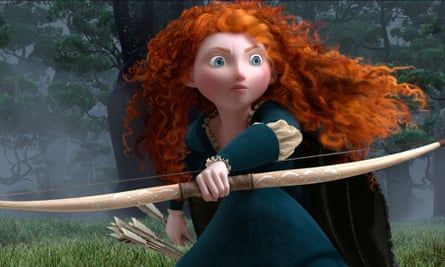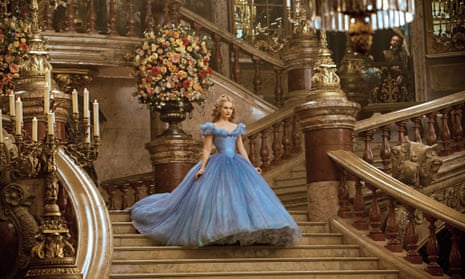It is perhaps the most famous fairytale of them all, the rags-to-riches story of a persecuted young woman who escapes domestic abuse, thanks to some magic and the love of a royal scion of a conveniently nearby palace. What’s not to like about Cinderella?
But as Kenneth Branagh’s remake of the classic Disney film from the 1950s opens in British cinemas this week, an unexpected whiff of controversy is in the air. Frozen and Brave, two previous Disney films, both cartoons, were praised for showcasing strong, feisty heroines; according to critics, Branagh’s Cinderella lamentably fails the role-model test.
In the United States, where the film has already been released, a backlash has begun. At press conferences and junkets to plug the film, both actors and director have faced questioning about the size of Cinderella’s waistline in the iconic blue ballgown.
The inquest followed a throwaway remark by the already slim actor Lily James, who said she had been on a “liquid diet” to wear the punishing corseted costume, which appears to give her a particularly small waist. Branagh felt obliged to state that the body shape is real and not digitised. James last week said the debate over the waistline was “on one hand upsetting; on the other hand, it’s just boring”.
“Why do women always get pointed at for their bodies? And why is this whole thing happening and I’m constantly having to justify myself? International Women’s Day has just gone by and it just feels a bit sad that this is still happening,” the British actress said. “Princesses are great role models; they teach you about grief and loss and have big hearts.”
The critics are not going away, however. Dr Rebecca Hains, author of The Princess Problem and professor of advertising and media studies at Salem State University in Massachusetts, says Cinderella is another case of the film industry peddling unrealistic body images and stereotypical messages to young girls. “From the release of the photos there was concern here,” she said. “This is an unrealistic beauty image, an exaggerated body type, and the fact that the actress then says, ‘oh yes, I was corseted so tightly I couldn’t eat’, I think is problematic. As is the plot. How brave is she really being? If she doesn’t have a prince, then she stays and accepts the abuse?”
The row has somewhat overshadowed the film’s release in the UK on 3 Aprilon Friday. This weekend an exhibition of costumes and props from the film, including the Swarovski crystal glass slippers and the pumpkin carriage, went on display in Leicester Square, London, but it is the messages of the film which are being most closely scrutinised.
Dr Rosie Campbell, a reader in politics at Birkbeck, University of London, said: “The storyline is just so appalling. This focus on beauty, this ‘pinkification’ of the Disney role model. No wonder we are struggling to get young women engaged with politics.
“On a more optimistic note, though, it is these kinds of obvious, extreme messages that are so discomfiting young women – that they so cannot ignore –that it has given them something to fight against. It’s started this fourth wave of feminism. Young girls are getting a lot more savvy about this kind of thing.”
According to Amy Morin, a psychotherapist and the author of 13 Things Mentally Strong People Don’t Do, the impact of cinematic role models such as Cinderella should never be underestimated.
“Children learn about themselves, other people, and the world in general based on what they see and hear,” said Morin. “Kids absorb lots of messages from media sources, such as TV commercials, cartoons and books. Sometimes the underlying messages are subtle, sometimes they’re more obvious. But over time those media messages can change how kids think and behave.
“Many fairytales, especially those containing princesses, can send the wrong message to kids. Allowing kids access to repeated unhealthy messages and gender stereotypes can have a harmful influence on kids. It’s important for parents to closely monitor what kids are being exposed to on a regular basis. That’s not to say kids shouldn’t ever be allowed to hear old-fashioned fairytales. Instead, parents should hold conversations with kids about the messages they’re gaining and they should balance them with media outlets that combat those stereotypes.”
For others, a fairytale is simply that: an ancient piece of fantasy folklore to warm a romantic heart.
TV Guide columnist Sadie Gennis said: “There is nothing helpful, healthy or feminist about shaming a woman for being skinny, any more than there is about shaming a woman for being fat. And it’s unfortunate so much attention is being paid to James’s body instead of celebrating the way her character in the film is not a victim saved by a prince but a courageous young woman who refuses to let her circumstances define her.”
Branagh has put on record the case for the defence, arguing that he deliberately portrayed Cinderella as a strong, independent character unaware of Prince Charming’s royal identity on their first meeting. “Not being a passive victim, someone waiting for a man to rescue her. That was not a message I particularly wanted to be part of sending out.
“She is empowered, good, thoughtful, strong. She asks questions about why her stepfamily are so cruel. She decides to stay in that house for a reason. She doesn’t dismiss the idea of service, thinking it’s not a thing to be ashamed of. And she’s really mature in the face of this mistreatment.”
This week cinemagoers will be able to make up their own minds.

ROLE MODELS
Ariel
The Little Mermaid’s red-headed Ariel is praised for rebelling against the patriarchy. She disobeys her father’s wishes to achieve her goals (even if her goal is to get the prince).
Elsa and Anna
Disney’s Frozen, which tells the tale of devoted sisters Elsa and Anna and snowman Olaf, is the biggest animation hit of all time. It is seen by some as a feminist leap in the right direction because Elsa takes her fate into her own hands and doesn’t rely on a prince to bail her out.
Merida
The Scottish, red-headed Merida, the heroine of Brave, was hailed by many as the first feminist princess because she refuses to marry the prince and looks like a real girl. She’s a rebel who rips her corset to compete better with the boys in an archery competition. However, she was subsequently treated to the kind of makeover that magazine pages habitually go in for - given a slimmer waist and doe-like eyes with heavy lashes.

Comments (…)
Sign in or create your Guardian account to join the discussion